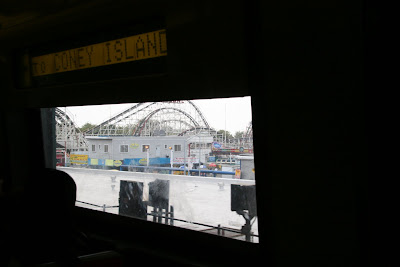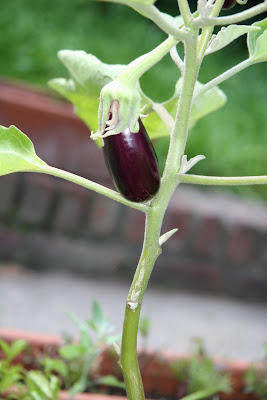
Friday, July 31, 2009
Thursday, July 30, 2009
life on the half shell

Monday, July 27, 2009
after jury duty today
garden jewelry II
Sunday, July 26, 2009
If on a Sunday night a traveller
A poem from my new manuscript, first published in the Mississippi Review. And then a poem from my second poetry book, Funny.
Monolog for Mother to Newborn Son
The other animals were such animals:
wolf, shrew, weasel, hawk, snake,
always hassling each other. It is less
spooky without them; less looking over
one’s shoulder, less looking on at
the feasting carnage. I am often
hungry, however, and it seems
there are limits to my pity.
Actually, this philosophical conversation
is a ruse to avoid the truth while
speaking of it. The truth is, last night
in my dream I ate you with a knife
and fork. After a while I noticed
you were half eaten and felt very
sorry about it. I woke up sick about it.
Still, you are wonderful
and your cheek is a tasty, chewy treat
I will try to protect you from my hunger.
The Sound of Those Drums
A man, walking alone
in the wild woods at twilight
begins to hear a rhythmic
pounding, resounding through
the space between massive
trunks of trees. I don’t like
the sound of those drums,
he says, frightened, aloud.
There’s a pause, then a woman
yells back He’s not our regular
drummer. Come out from in there.
Walk out from the darkness
between the evergreen and
deciduous and say it is ridiculous,
this hiding in my song. What
a bunch of brave brutes we
are; how talented it is
to fearfully play in our combo
even when we may be mistook
for threat of war, or, worse,
critiqued for our interpretation
of the score. How we arrive
with our casserole dishes
extended, our chocolate hearts
on a platter of fingers, lips
pursing in the plump of a kiss,
offered and offering! He takes her
in his arms, whispers that he is
always scared, she says she’s
sensitive to negative critique.
He takes her in his arms, whispers,
I don’t like the sound of those
drums, she says, He’s not our usual
drummer. Through it all a sweet
groaning, intoning. The more
they understand of these
translations, the more
they lose interest in this plane
of existence. Instead, it is still
wintertime. People have been talking
a lot about snow. You are
letting go of even letting go. You are
listening and it is sometimes
very interesting. You keep
your eyes at a far-away glaze,
You feel the weight of your hands.
The trees shimmer, tinseled
winter tremors in the wind. Things
have a salt haze. Life is a plump
plum today, a thump on your
skin, an unknown drum, humming.
Saturday, July 25, 2009
in which i make eggplant parma
garden jewelry
Friday, July 24, 2009
poem
Trotsky’s Hand
I
It’s like dreaming of someone
too much while you’re away
at war; then you come home
to his fingered hat or her
faltering hemline and it’s
What the hell was I fighting
for? Just another example
of how biography works.
Your character has got
to have a narrative arc,
some drawbacks,
something irredeemably awful,
along with his or her strong
points, to be believable.
Yet we all recoil in disbelief
when anything of the sort cuts
a form into our real lives,
the life of the author. Don’t
despair! It’s just the demands
of narrative! Leda, after all,
probably never even thought
to fear anything like that.
Then one day, there it is,
the century actually over
and most of its artifacts
still entirely inexplicable.
This is no walk in the park
with spinach, Swee’pea,
I’ve got no idea where to go
for extra strength.
I guess that’s what
they’re selling.
It’s an incidental
that it cleans your laundry,
scrubs your teeth. What is of note
is that it is a source of extra
strength. Extra strength! Thank
God! That’s what we’re going
to need in case they all switch back:
the swan, the prince, the salt.
Even if you weren’t ever accosted
by a feathery god,
you take some heavy losses early on,
and that will leave feathers everywhere
for the rest of your life; as if
you were wearing an eiderdown coat;
you just walk around and molt.
As for the man in the tiara,
that’s a transformation
you never want to go through
twice, but do, coaxing every
so often your sad, damp, frog
back into his palace. Don’t
you like your scepter? Won’t
you wear your robes?
Lastly, salt. Well, who doesn’t
turn towards the sepia for a second
look; into the carousel music
and the tortured plaster horses
of the past? But this sympathy
does not imply that I want
Madame Lot back here
knitting itchy sweaters.
Let’s just try to calm down.
II
When Stalin took power
he had Trotsky erased
from the photographs.
Sometimes, you can still see
a floating hand. Left behind.
So disembodied as to be
almost meaningless. We try
to ignore it, floating there
in history. We get to work.
There is something to be said for that.
You can’t really expect me
to roll around naked in a garden
letting Trotsky’s severed hand
float around my body,
knowing my body better
than any lover, his soft,
soft-focused, probing hand.
Yet, how can we do anything
serious with that thing hovering
overhead? A woman working
at a table in the park swats
away the tickling hand
of Trotsky, and intones
as if to all of history:
Not now. Trotsky’s hand,
abashed, moves on
to pick some flowers.
So much is gone that
what is left is inexplicable
without memory, and memory
is painful and very difficult
to explain. Which isn’t
to say I mind Trotsky’s hand
snapping its fingers
and flapping itself like a bird
above my desk or would rather
have him back, extant,
yammering about world socialism
and complaining about
the samovar: Is this thing cold again?
So, is this more of a lament
than a complaint? Sure.
But it is always there. This
burden of history is not a bird
but a hand, its wrist a tiny cloud.
It’s very quiet. It fills the quiet sky.
///
It is from my first poetry book, The Next Ancient world. I'm not sure what made me want to say it to you just now. Oh but now that I think about it I suppose a few things come to mind. the prince, the swan, the salt. note to self: keep your eye on what transforms, note what of it doesn't change, and henceforth keep your eye on that.



 tide
tide

















